It’s no surprise that Google holds the dominant market share when it comes to search, with over 92% of the global market share (as of April 2023). This means that Google is the most popular search engine by far, with Bing, Yahoo, and other search engines trailing behind by quite a bit. As a result of this popularity, Google Search has become synonymous with finding information online… When was the last time someone told you to “bing” a piece of information?
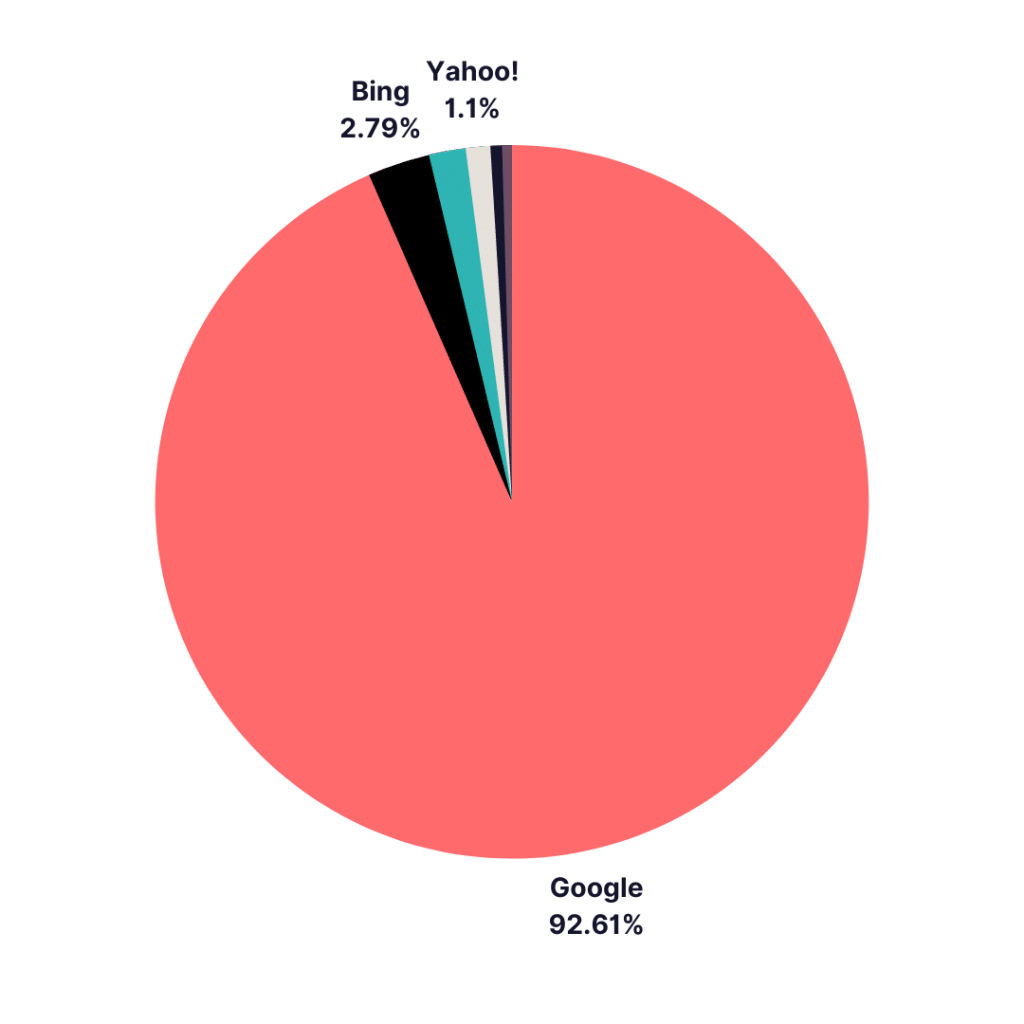
Despite Google’s iron grip on search, complaints about the platform are becoming increasingly common. People are frustrated with Google ad links and the fact that the top result isn’t always the most credible source. In fact, a SEMrush survey into “Zero-Click” searches found that almost 30% of people have to redo their searches due to inaccurate or irrelevant results. Offering personal opinion, Redsharknews.com (2023) states:
“In today’s world of dynamic content websites and services, it often cannot find the information that people are searching for. I’ve been noticing this myself, with lots of the same sites appearing, or at least some very limited, repetitive results, along with lots of sponsored links. I’ve often wondered, why, given the millions, perhaps billions, of websites that must exist around the world, Google seems to return such limited search results now. It makes for a frustrating experience.”
The author here states that users in droves seem to be turning to the likes of Reddit and TikTok for alternative searches – as Google just doesn’t seem to cut the mustard for multimedia and first-person unbiased content.
So the question is, do the above issues leave Google open for a smarter, better replacement?
The AI chat bot paradigm shift & the uptake of Chat-GPT
So far in 2023, a new paradigm shift is taking place with generative AI chatbots. For many, it feels like this shift has crept up incredibly fast with the viral explosion of Chat-GPT. Even Snapchat has released their own AI chatbot based on Chat-GPT called “My AI“. I remember in and around 2022, I was seeing a lot of content popping up on my TikTok feed showing AI-generated music, album covers and more. A TikTok user states “AI [is] taking over everything, first art, now music…” Never did I consider the same could potentially be said for Google!
AI chat bots use complex neural networks to provide users with instant and accurate information, free from sponsored links and “gamified” search results. The AI chatbot approach provides a streamlined and efficient way to access information, without the need to filter through multiple web pages.
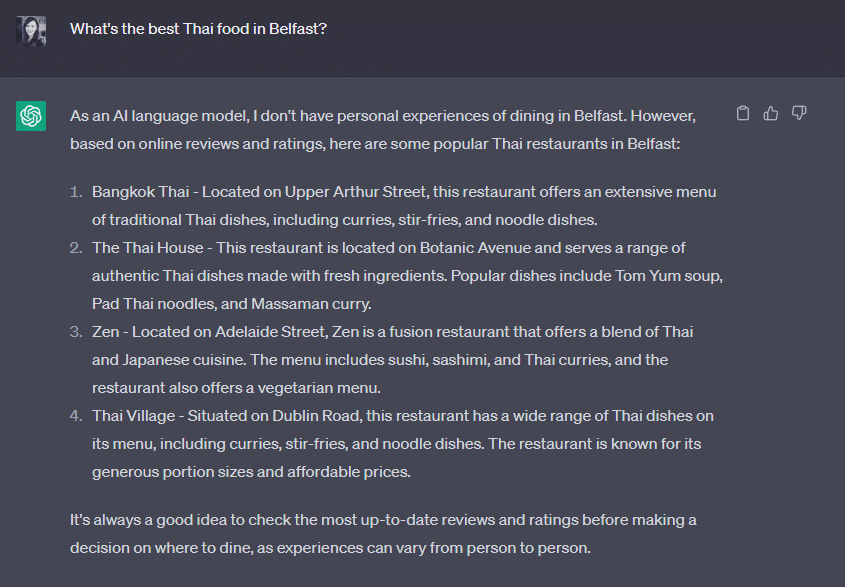
There are a few reasons why AI has become popular for searching for answers in 2023:
- Advancements in AI technology: Over the past decade, AI technology has become increasingly sophisticated, allowing for more accurate and nuanced responses to user queries. This has made AI-powered search more reliable and effective. Here at Digital 24, we have been wowed at the leaps in sophistication this past couple of years!
- Rise of natural language processing: I’ll go into more detail on this later, but, the rise of natural language processing has made it easier for users to search using natural language queries.
- Convenience and speed: AI-powered search engines offer a level of convenience and speed that traditional search engines can’t match. With AI-powered search, users can get answers to their questions quickly and easily, without having to spend time sifting through search results.
Natural language and how users ask for information
The way chat bots and search engines produce results is vastly different. Chat bots act as a “personal assistant”, answering user queries to the best of its ability. Whereas, Search Engines act as indexes of the world wide web. Here’s where I think things get interesting. Historically, users have used search engines by offering up select keywords or “head terms” to find the answers they need. For example, “training google”. However, it seems AI chat bots have come along at just the right time. Reason being, over the past few years, there has been a notable shift towards use of natural language when it comes to search engines driven by:
- Smart speakers: The rise of smart speakers and digital assistants like Amazon Alexa, Google Assistant, and Apple Siri have made it more common for users to use natural language when searching for information. This has translated into users carrying over the habit to Google Search.
- Increased internet literacy: As more people have become comfortable using the internet and search engines, they have become more comfortable using natural language queries to find information. This has led to a shift away from using short keywords towards longer, more descriptive search terms.
Natural language can be longer, more descriptive asks of the search platform. The exact type of query that you might use if you were talking to a personal assistant. An example of this might be, “agencies that train on google ads in Belfast”. This means that, although new, using AI doesn’t feel foreign. As well, when Chat GPT gets you what you need seamlessly, it can almost sometimes feel like a good replacement for search platforms we would’ve used otherwise. Reason being, we haven’t had to change our natural behaviour to fit in the with changing technology – we’ve simply changed our information source.
Why isn’t Google Search going anywhere?
Keyword searches often typically fall into 3 categories: navigational, intent to purchase or intent to find information. While AI chatbots are often touted as being superior to search engines in their ability to provide instant answers to users’ questions, they may not be as effective for transactional searches or navigational searches. This is because chatbots lack access to live data and may not be able to provide the most up-to-date and accurate information on website URLs, pricing, availability, or other details that are critical to making a purchase decision or navigating the internet. Google, on the other hand, is optimised for transactional and navigational searches. Google’s algorithm takes into account a wide range of factors, such as the relevance and credibility of the website, user reviews, and other data, to provide users with a list of relevant companies and products. This allows users to compare different options in detail and make an informed purchase decision.
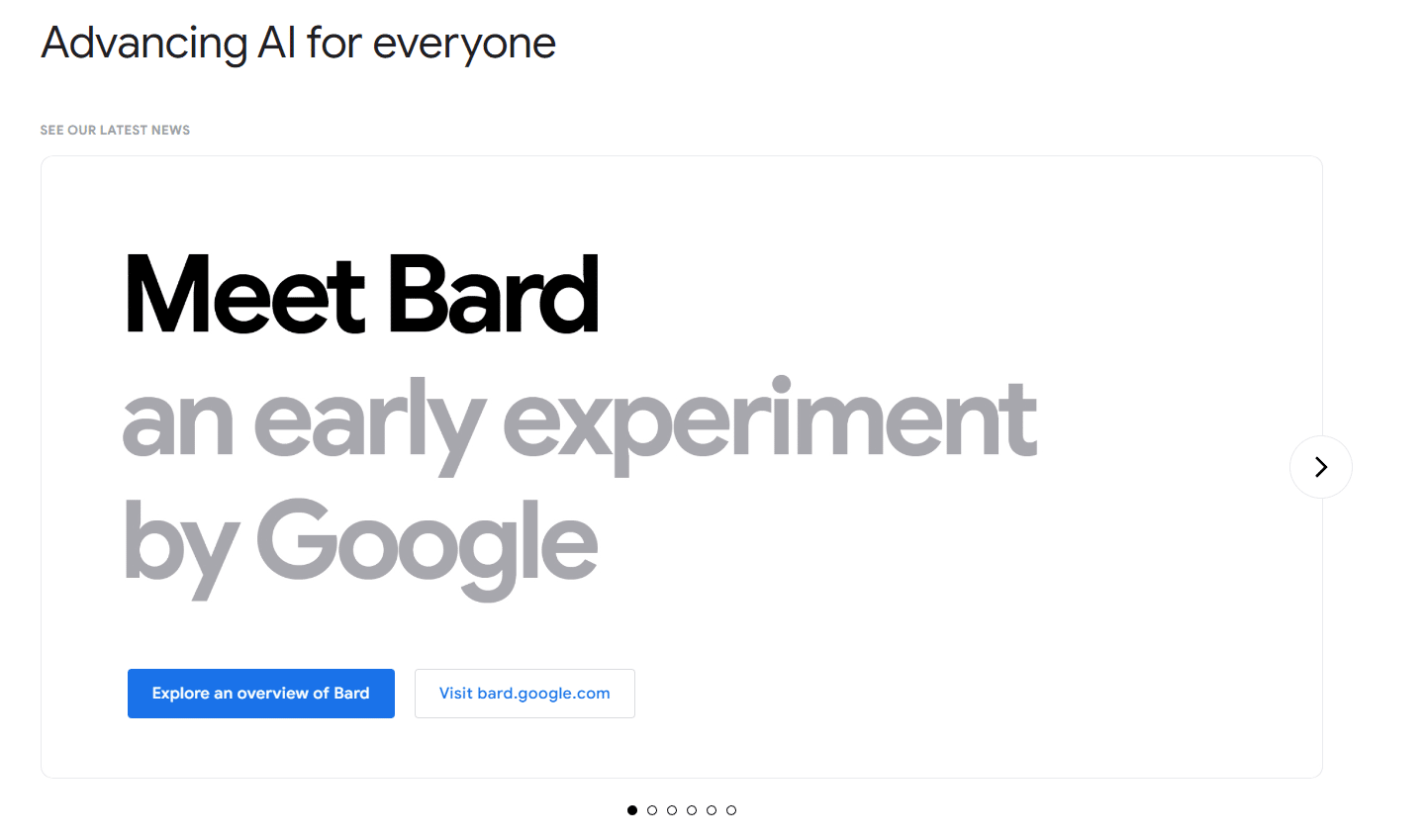
All in all, we can’t ignore the fact that GPT-4 and its similar counterparts are vastly different in function than Google Search with the former being an assistant and limited in its own ways. Regardless, information-based search is not the primary form of use for Chat-GPT and is also not its strongest function either given its real-time data limitations. Detailing actual use of Chat GPT, a 2023 survey by YouDictionary found that 41% of respondents say they use the platform to generate ideas, 20% to create content, 14% to respond to an email, 11% to write code, and 10% to write a CV or cover letter.
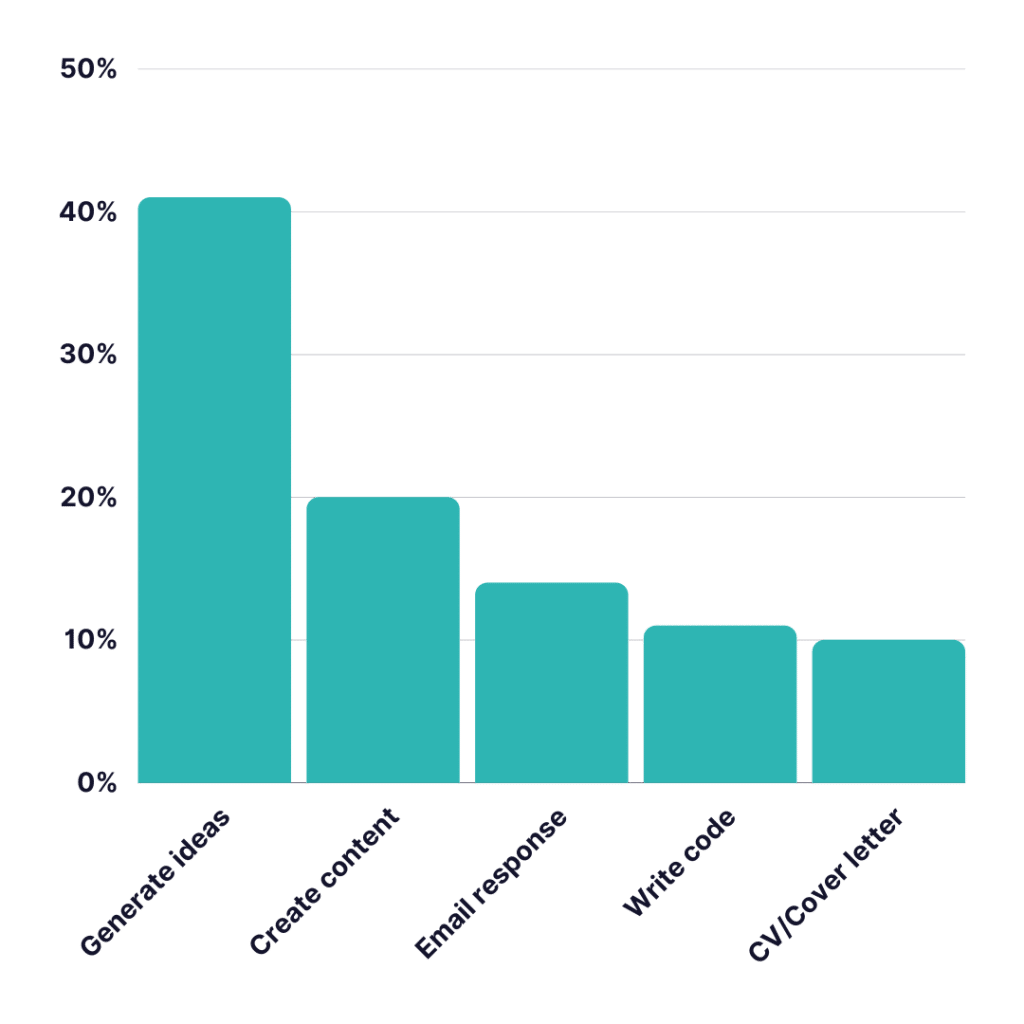
Ultimately, the future of search is likely to be an iterative process, with search engines and chatbots coexisting. During the rise of home speakers such as the Amazon Alexa and Google Home – many marketers had claimed that Search Engine Optimisation and how users search was going to change forever. While this may be true in the effect on use of natural language, we still find text-based search continues to reign as King when it comes to SEO. This is exactly how I see AI affecting the search engine market. While it may be impactful, it will not take over.
Historically, Google has been on top of user behaviour, trends and preferences as shown by their release of BERT as a response to users shifting towards use of natural language. This is why they’ve stayed at the top of the search engine game for as long as they have. When it comes to the rise of AI, Google is already releasing over 20 AI products this year, including its own chatbot, Bard (currently with an open wait list). As such, the future is likely to involve incorporating chatbots into search results, advancing the existing power of BERT and providing a more advanced version of the “knowledge panels” that appear when searching for entities. Google states:
“Google’s mission has always been to organize the world’s information and make it universally accessible and useful. We’re excited about the transformational power of AI and the helpful new ways it can be applied. From research that expands what’s possible, to product integrations designed to make everyday things easier, and applying AI to make a difference in the lives of those who need it most-we’re committed to responsible innovation and technologies that benefit all of humanity.” (ai.google.com)
While the future of search is uncertain, it’s clear that the shift towards AI chatbots will be a game-changer for how we access and interact with information online. However, much like our preference towards Natural Language as caused by familiarity and voice search, we’re unlikely to feel the change. And from an SEO perspective, the introduction of AI is most likely going to be similar to best practise already set in place by BERT and have most user-noticeable effect where rich results play a key role. This may mean updates for structured data.
In summary, AI may have the potential to enhance search results in the future, however, given that both platforms offer different value and have different uses, it’s unlikely we’re going to see chat bots replace Google. In case my research, thoughts and opinions weren’t enough – I just went ahead and asked Chat GPT what its plans were…
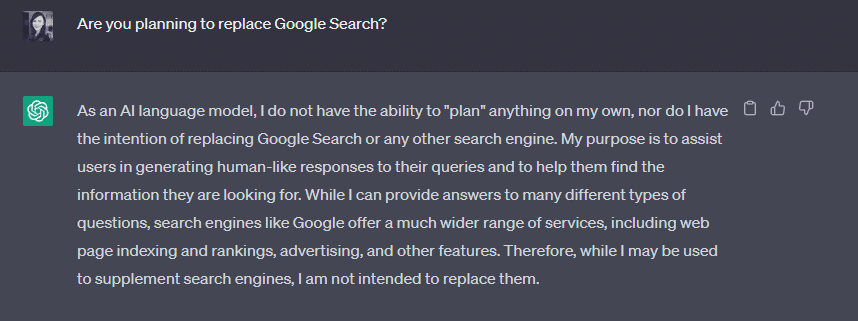
It seems we’re safe!


